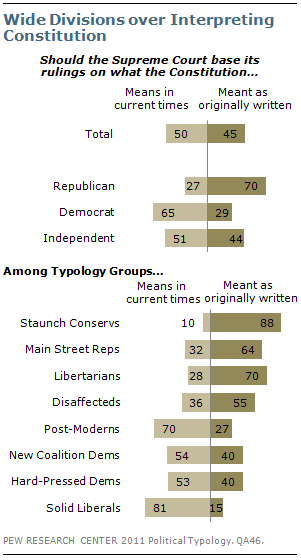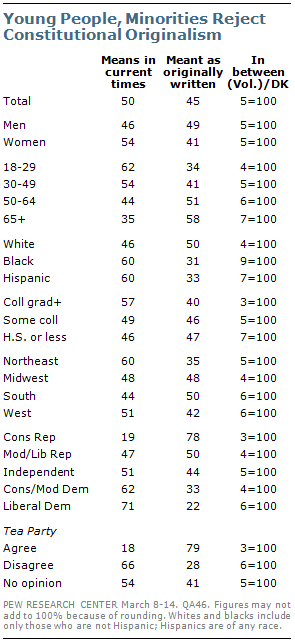As the Supreme Court’s current term concludes, public opinion is evenly divided about how the justices should interpret the Constitution when determining their rulings. Half of Americans (50%) say the Court’s rulings should be based on its understanding of what the U.S. Constitution means in current times, while about as many (45%) say rulings should be based on its understanding of what the Constitution meant as originally written.

Few issues are as politically or ideologically divisive as how the Constitution should be interpreted. In the Pew Research Center’s political typology survey, released May 4, 70% of Republicans said the Supreme Court should base its rulings on its understanding of the Constitution as originally written; 65% of Democrats said the Court should base its rulings on what the Constitution means today.
The differences are even starker when viewed through the political typology, which sorts people based on their values, political beliefs and partisan affiliation.
Constitutional originalism draws overwhelming support from Staunch Conservatives, who are mostly older white males and include the largest percentage of Tea Party supporters (72%) of any group. Fully 88% of Staunch Conservatives say the Supreme Court should base its understanding of the Constitution on how it was originally written. Among other Republican and GOP-leaning groups – Main Street Republicans, Libertarians and Disaffecteds – smaller majorities favor an originalist approach.
Solid Liberals –who are mostly highly politically engaged, pro-government seculars – reject constitutional originalism by nearly the same margin as Staunch Conservatives support it: 81% say the Court should base its rulings on its understanding of what the Constitution means in current times, while just 15% say justices should base their rulings on an understanding of what the Constitution means as it was originally written.
Younger Americans are more likely than older Americans to say the Court should interpret the Constitution based on its meaning in

current times (62% of 18-29 year olds say this, compared with just 35% of those age 65 and older). And college graduates are more likely than others to say the interpretation should be based on the Constitution’s modern-day meaning (57% say this, compared with 49% of those with some college experience and 46% of those who have not attended college).
Six-in-ten (60%) African Americans and Hispanics say justices should base their rulings on an understanding of the current meaning of the Constitution, while opinion among whites is more evenly split (50% original meaning, 46% current meaning). And although men are about equally divided on this question (49% say the Court should interpret the Constitution based on its understanding of the original meaning, 46% say its understanding in current times), 54% of women say the Court should base its rulings on its understanding of the document’s meaning today.
About eight-in-ten (79%) of those who agree with the Tea Party movement say the Supreme Court’s rulings should be based on an understanding of the original meaning. Conversely, two-thirds (66%) of those who disagree with the movement say rulings should be based on the Court’s understanding of the Constitution in current times.




